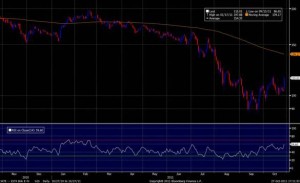Of the US economy
The US economy in the third quarter of 2011 grew at a 2.5% annual rate according to the first estimates released yesterday. Thus earlier fears of a recession have proved much exaggerated. Inventories rose at a slower rate in the quarter, enough to reduce the estimated growth rate by 1.1%. This must be regarded as good news – investment in inventories grew more slowly because final demand was unexpectedly high, implying that output and orders to come will be augmented by planned restocking. Final demands were hugely boosted by a 17.4% surge in spending on equipment and soft ware and spending on non-residential structures that were up by a 13.3% per annum rate in the quarter. US companies are drawing on their piles of cash to add capacity and competitiveness but remain reluctant to add to their numbers of employees.
Of banks everywhere
Banks in Europe were required to write off €100bn of Greek government debt. The banks, against their own wishes, have also been required to boost their impaired capital to 9% of the assets on their balance sheets. Where this capital is to be sourced is not fully known but the much augmented European Stability Facility may well be called upon in addition to shareholders. The upshot of the weekend action taken by European governments (still lacking in detail) was an enthusiastic response recorded in the markets, and in particular in the market for bank shares (and not only in Europe). By the close in New York the Bank of America share price was up 9.6%, Citibank had gained 9.7% and JPMorgan was up 8.3%.

The losses that banks have had to take on their books has been more than made up for in gains in market value. Which again indicates an important point, that raising equity capital (and diluting existing shareholders) can add to the market value of a banking (or any other) share when it serves to reduce meaningful bankruptcy risks. Private shareholders in banks, when called upon to subscribe additional capital in due course, might bear this win-win prospect in mind.
The Eurostoxx Index of Banking Stocks that had fallen by more than 50% between March and September is now about 16% up from these lows. Of the leading French banks, BNP gained 16.93% on the day, SocGen was up 22.5% and Barclays in London gained 17.6%, while our own Investec shares in London were up a more modest 6.4%.
From our analysis at http://blog.frontierstrategygroup.com:
Frontier Strategy Group sees a greater than 50% chance that Greece will leave the Euro. Companies have two months to put contingency plans in place for Greece. Companies choosing to remain in Greece will need to develop strategies to finance suppliers and distributors as credit from Greek banks will dry up. Opportunistic companies are considering using Greece as an export hub, as leaving the EU would likely devalue the local currency by 50%, making Greece an attractive long-term play from a cost point of view.
Greece leaving the Euro increases the likelihood of a double dip recession across Europe. European banks will take major losses in the their bond portfolios. Markets will also view a Greek exit from the Euro as a precedent for similar action in Portugal, Spain and potentially Italy. Exposure to derivates on bad debt is still unknown, compounding the uncertainty that will cause lending to dry up in both Western and Eastern Europe. Last time Europe went into recession, CEE markets, Russia and Turkey suffered disproportionately. This time, many emerging markets are more linked than before.